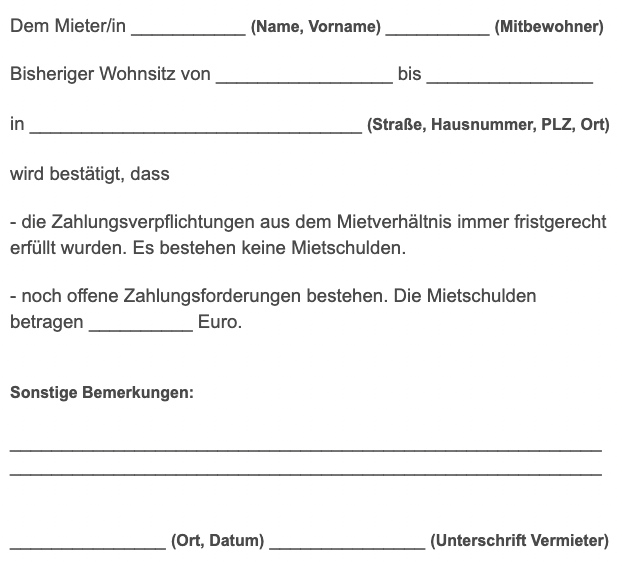
Equally important for tenants and landlords
A certificate of freedom from rent arrears confirms that a tenant has a reliable and punctual payment history with regard to rent. Landlords are not legally obliged to issue such a certificate. However, it can be very important for a tenant, as it significantly increases the chances of finding a new apartment. Landlords often require proof of rent arrears from prospective tenants because they want to avoid payment defaults and filter out rental nomads from the applicant pool. However, individual cases from the past show that the certificate is not always issued correctly.

What is a certificate of freedom from rent arrears?
The confirmation of freedom from rent arrears is a simple form used by a landlord to certify that a tenant has paid their rent regularly and on time in the past. There are various forms and sample PDFs for the certificate of freedom from rent arrears, which you can find on numerous relevant websites on the Internet. However, the Federal Court of Justice ruled several years ago that tenants have no legal right to a landlord’s certificate of freedom from rent arrears. Nevertheless, it still happens regularly that landlords request a certificate of freedom from rent arrears. Whether a landlord is allowed to charge for issuing such a certificate is not clearly regulated by law. However, as the service is not mandatory, this may well be permissible.
When and why is the document needed?
Proof that you are free of rent arrears serves to confirm to a potential new landlord that you have an impeccable payment history. This gives the landlord a helpful indication of whether there is a risk of non-payment. Tenants, in turn, have an uncomplicated means of proving their creditworthiness and trustworthiness. However, as there is no legal entitlement to the certificate, landlords must also offer alternatives. These include, for example, the prospective tenant’s payslips. As a landlord, you may only accept the letter once a concrete interest in an apartment has been expressed, as information of this kind at an earlier point in time is not considered sufficiently relevant from a data protection perspective. This means that a request to submit proof of freedom from rent arrears at the first appointment is not permitted. If landlords nevertheless receive such a confirmation beforehand, it should be deleted without request and such documents should only be accepted after a concrete interest has been expressed. In this way, you avoid putting other applicants at a disadvantage.
Are you looking for an attractive investment property for your future financial planning?
Then you are sure to find what you are looking for with us. Put your trust in our many years of expertise in real estate investment and contact us today so that you can look forward to a secure tomorrow.

Contents of the certificate of freedom from rent arrears
As there is no legal entitlement, there are no legal requirements regarding the required content of the form. The certificate of freedom from rent arrears usually contains information on the name, address and contact details of the landlord or property management company and the tenant, as well as a limitation of the rental period. It must also state whether the termination was ordinary or extraordinary, i.e. without notice. There is also a passage confirming that the rent has been paid in accordance with the contract. If there are rent debts, they must be stated in full, including repayment agreements. With his signature, the landlord confirms his details in a legally valid manner. The place and date must also be attached.

No rental debts when selecting tenants
If a confirmation of no rental debts is filled out completely and correctly, you as the landlord have a useful indication of a positive payment history and a good credit rating of the prospective tenant. As a rule, information from the previous landlord can be considered trustworthy. However, the landlord is not obliged to provide the tenant with written proof that they are free of rent arrears. In addition, it is not possible to issue a certificate of freedom from rent arrears for a property if the applicant has not previously lived in rented accommodation. It is therefore advisable not only to apply for a rent-free certificate, but also to accept alternative confirmations. This can be a credit check, for example via a Schufa report, wage and salary statements for the last three months, or simply a self-disclosure from the prospective tenant. As a safeguard against rental nomads, it can be helpful to consult relevant databases on the Internet in which affected landlords provide information about rental nomads.
A limitation period of three years applies to rent arrears. However, this does not start immediately, but only from the end of the year in which the claim arose. This means that if rent arrears arise in January, the period is effectively extended to almost four years. The period is suspended if an action is filed in court or the creditor applies for a default summons.
Landlords can sue for rent arrears within the limitation period. As legal action suspends the limitation period for the claim, the period is interrupted.
Before you, as the landlord, send your tenant a warning letter, it makes sense to contact them first and set them an informal deadline. It is advisable to take this route first, especially in the case of otherwise good tenancies.
If payment is not made, you should send a reminder by registered letter. This should state the due date for payment, the amount of the outstanding payments and your bank details.
If the tenant still does not pay, you can file an action for payment reminder with the court within eight days of the due date or obtain a notice of termination directly.
Under certain circumstances, landlords have the option of terminating the tenant’s tenancy without notice if they do not pay their rent or only pay part of it for two consecutive months or if they owe at least two months’ rent over a longer period of time. If the tenant pays the debt, the extraordinary termination is invalid. Extraordinary termination is often carried out in conjunction with legal proceedings.
A warning is not necessary for a termination without notice. However, if the requirements for this are not met, a warning is necessary in order to at least be able to issue a termination with notice. The warning should be issued within the three-year limitation period.
In 2009, the Federal Court of Justice ruled that landlords are not obliged to issue a confirmation of freedom from rent arrears. It is issued on a voluntary basis.
